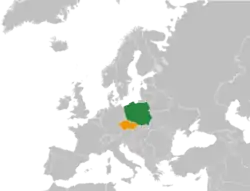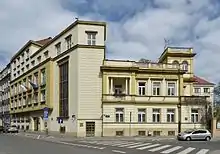Czech Republic–Poland relations
Poland and the Czech Republic are both members of the European Union and of NATO. Both joined the EU simultaneously on 1 May 2004. They also both joined NATO on 12 March 1999. Both countries, together with Slovakia and Hungary, form the Visegrád Group, which is an important regional group in Central Europe. They share 796 km (495 mi) of the common border, which can be crossed anywhere without border control under the Schengen Agreement. In a 2010 poll conducted by CVVM in Czech Republic, relations with Poland were ranked as the second best out of 13 countries, after Slovakia, with 92% of respondents viewing them as very good or rather good.[1] In 1993, according to polls, the Czechs were liked by 38% of Poles, with 28% negative opinions. There has been a big improvement since then, and recently the Czechs are among the most-liked nations in Poland, leading in the polls since 2010 (53% of favourable opinions in 2010, 56% in 2019).[2][3]
 | |
Poland |
Czech Republic |
|---|---|
Resident diplomatic missions
- Czech Republic has an embassy in Warsaw.
- Poland has an embassy in Prague and a consulate-general in Ostrava.
 Embassy of the Czech Republic in Warsaw
Embassy of the Czech Republic in Warsaw Embassy of Poland in Prague
Embassy of Poland in Prague Consulate-General of Poland in Ostrava
Consulate-General of Poland in Ostrava
2020 Czech Republic–Poland border incident

Poland closed their borders in May in 2020 as part of its response to the COVID-19 pandemic.[4] The Polish Armed Forces were deployed to the region to guard the border and enforce pandemic travel restrictions.[4][5]
In late May 2020, Polish Military troops arriving from Pielgrzymów crossed the Hrozová stream marking the border with Czechia, and unintentionally occupied a few dozen meters of Czech territory in the former village of Pelhřimovy, near the town of Slezské Rudoltice. Armed Polish soldiers set up a roadblock in front of a chapel, and prevented Czech citizens from accessing the area.[5][6] On 28 May, Polish troops barred entry by a restoration expert and also forbade photography.[5][7] In early June a group visit organized by the Hnutí DUHA environmental group was turned away, with Polish soldiers ignoring pleas from the group that they were in the wrong country.[5][7] The Police of the Czech Republic became involved, and the Polish troops were ordered to leave,[7] though this did not occur immediately.[5] Towards the end of the unintentional occupation visits by Czech citizens to the chapel were permitted.[5]
Following Czech diplomatic protests, Polish troops withdrew in early June.[4][6][5]

The Saint Anne chapel in Pelhřimovy had been abandoned for several years during the Cold War as it lay effectively within a no man's land. After the borders were opened up because of the Schengen Agreement, Czech and Polish volunteers restored the chapel, and regular church services have been held there since.[8]

During the unintentional occupation, Polish troops turned away Czech citizens who were trying to access a historic chapel in their own country.[6] According to the Czech Republic, the Czech embassy in Warsaw notified Polish authorities of the incursion,[6] however Poland's Foreign Ministry states they were not formally informed.[9] On Thursday 11 June the Polish high command stated its troops were withdrawing from the occupied territory.[10]
On Saturday 13 June Poland re-opened its borders with the Czech Republic, Slovakia, and Germany, while keeping the border with Russia, Ukraine, and Belarus closed.[4] The Polish military admitted the invasion and occupation but stated that the event was a "misunderstanding".[6] On Friday 12 June the Polish Ministry of National Defence stated that "The placement of the border post was a result of a misunderstanding, not a deliberate act. It was corrected immediately and the case was resolved -- also by the Czech side".[6] The Polish opposition demanded that the government be held accountable. Former Minister of National Defence Tomasz Siemoniak said that someone should be fired for the affair as it was not handled well leading to the ridicule of Poland in the media.[11][12]
The Czech Ministry of Foreign Affairs stated that Czech authorities were back in control and the Czech citizens may access the site.[6] While the Czech received informal assurances from the Polish side, they were still awaiting a formal Polish statement: "Our Polish counterparts unofficially assured us that this incident was merely a misunderstanding caused by the Polish military with no hostile intention, however, we are still expecting a formal statement".[6]
See also
References
- CVVM Archived 2007-07-07 at the Wayback Machine, Občané o vztazích ČR s některými zeměmi – listopad 2010
- Stosunek Polaków do innych narodów. Komunikat z badań, Centrum Badania Opinii Społecznej. Warsaw. February 2013 (in Polish).
- Kogo nie lubią Polacy? Sprawdź, co wynika z najnowszego badania CBOS. Gazetaprawna.pl. 2019-02-07 (retrieved 2020-04-24)
- Embury-Dennis, Tom (13 June 2020). "Poland accidentally invades Czech Republic and annexes part of neighbour's territory". The Independent. Retrieved 15 June 2020.
- Johnston, Raymond (15 June 2020). "Polish invasion of Czech Republic makes world headlines - Prague, Czech Republic". Expats Czech. Retrieved 15 June 2020.
- Picheta, Rob (12 June 2020). "Poland accidentally invaded the Czech Republic last month". CNN. Retrieved 15 June 2020.
- Cameron, Rob (13 June 2020). "Poland 'invades' Czech Republic by accident". BBC News. Retrieved 15 June 2020.
- Via, Teilen. "Polnische Soldaten besetzen tschechische Kapelle | MDR.DE". Mitteldeutscher Rundfunk (in German). Retrieved 15 June 2020.
- Dwyer, Colin (13 June 2020). "Poland Accidentally Invades Czech Republic In 'Minor Misunderstanding'". NPR. Retrieved 15 June 2020.
- Cienski, Jan (11 June 2020). "Poland calls off Czech invasion". POLITICO. Retrieved 15 June 2020.
- "Opozycja żąda wyjaśnień ws. "okupacji czeskiej kapliczki". "Zostaliśmy ośmieszeni"". ONET. 16 June 2020.
- ""Ktoś powinien za to polecieć" . Siemoniak komentuje sprawę zajęcia przez Polaków czeskiej kaplicy". RMF25. 16 June 2020.

